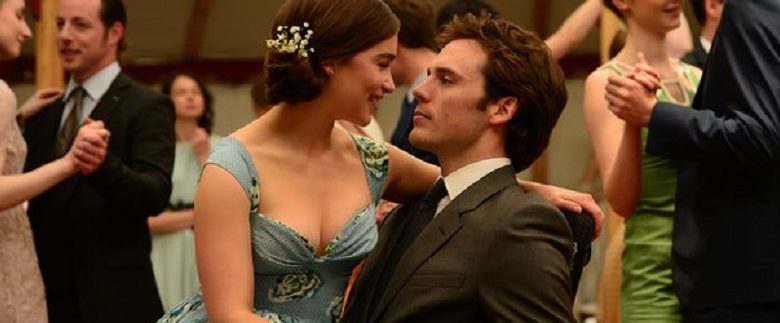
Me Before You: why I’m boycotting this film
Out resident entertainment reporter Hayleigh tells us why she’s unequivocally decided not to see the much-publicised film Me Before You. And here’s why…
I am not usually one for rules. However, there is a self-imposed one that, miraculously, I have so far been able to keep. That is, I will not slate a movie unless having first seen it. I tend not to read reviews or pay much attention to Box Office figures – if I want to see a movie I go to see it regardless of commercial or critical success.
Up until recently I managed relatively easily to abide by this rule. That was up until a few weeks ago when Me Before You was released. I confess I have broken my rule and, despite writing about it, have decided unreservedly to boycott this movie.
Me Before You tells the story of paralysed banker Will Traynor (Sam Claflin) and his carer Louisa Clark (Emilia Clarke), who had recently been fired and struggled to find a job. Having become paralysed after being hit by a motorcycle, Will has decided to opt for euthanasia at a Swiss clinic.
The crux of the story centers around Louisa’s attempts to demonstrate to Will that life is still worth living despite the challenges of disability.
 SPOILER ALERT! Having conducted research (okay, I read the plot on Wikipedia to find out how it ends) and read reviews, I’ve discovered that after a brief romance, Will decides to go through with his original plan of assisted suicide and leave his fortune to Louisa – so she can live “a fulfilled life”. Knowing this, I can safely say that this is not the type of movie I would want as a contender for accurately depicting disability.
SPOILER ALERT! Having conducted research (okay, I read the plot on Wikipedia to find out how it ends) and read reviews, I’ve discovered that after a brief romance, Will decides to go through with his original plan of assisted suicide and leave his fortune to Louisa – so she can live “a fulfilled life”. Knowing this, I can safely say that this is not the type of movie I would want as a contender for accurately depicting disability.
Now, when it comes to euthanasia I hold up my hands and say I am pro-choice. In no way do I consider it an easy way out or an easy choice to make. But from what I understand, the movie fails to illustrate the complex nature of disability or of assisted suicide.
The Director, Thea Sharrock, claims that she wanted to make disability ‘normal’, but to do so without depicting scenes involving personal care, transferring etc. Would anyone else like to point out that these are normal daily activities for many people with disabilities?
It puts me in mind of the French comedy/drama film, The Intouchables, starring François Cluzet and Omar Sy. It plays out more as a guy’s night out between quadriplegic Phillippe and his care assistant. Many scenes showed Phillippe being transferred, fed and dressed, not as a means to educate or patronise the audience, but instead to drive the narrative and develop characterisation. Watch the trailer for The Intouchables if you get a chance to see what I mean.
Someone needs to tell British cinema and Hollywood how to accurately depict disabled people. The ongoing trend is to categorise disability-related stories into two columns: inspirational porn or we all want to die (thanks Me Before You for being the poster boy for that campaign!).
What the media doesn’t seem to understand is how damaging and dangerous these messages are. What kind of message does it send to younger generations about the value of their life if movies such as Me Before You pretty much suggest (albeit unintentionally) that life with a disability isn’t worth living?
Added to that, those of us with romantic partners already face the stigma of society desexualising people with disability, so we don’t need the added pressure of feeling like burdens. Basically what this movie says is: “Hey Louisa, here’s a big wad of my cash. It can make you so much happier than I can… cos you know the whole wheelchair thing and all…” Who said romance was dead!
To round it off we need to consider how people who have newly developed disabilities (spinal injury, mental health issues, progressive disabilities…) will interpret such messages. The character, Will, can’t see beyond the possibilities of his previous life and so opts for death. What exactly is that telling people? What I am hearing is: “Now you have a disability your life has no meaning or value.” For people newly adjusting to life with a disability (whilst often at their most vulnerable), this is a particularly disturbing concept.
I think it is safe to say that nothing in this world could tempt me to watch this movie, and judging by the backlash from disability groups and protests outside a London West End cinema, I won’t be the only one boycotting. Yet again, another disappointing media representation. It is 2016, time to do better!
By Hayleigh Barclay
Get in touch by messaging us on Facebook, tweeting us @DHorizons, emailing us at editor@disabilityhorizons.com or leaving your comments below.
I absolutely disagree. We cannot have a situation where the only representations of disabled people are positive. Many disabled people, certainly newly disabled people feel exactly this. This is a very accurate depiction of my own situation and from speaking to medical staff it’s not uncommon. The general public also need to understand that not everyone with a disability feels as you do. Many are deeply depressed and believe their family and friends would be better off without them. Their family and friends cannot get through to them how wrong they are. What you are advocating is the total censorship of all mental health issues and presumably by extension all war films must only show happy endings, as they used to 50 years ago. If films can’t show the reality of life for many disabled people then why should they show the aspects of reality that you miss? It’s like the post London 2012 assumption that all wheelchair users are superfit paralympians who can do anything they put their minds to. The reality is that although there are now better facilities since the Olympics there is also a lack of understanding of how limiting disabilities often are, particularly for newly disabled people. Of course the film could have had a fairy tale “all lived happily ever after ending” but that would have lacked credibility. My personal story does have a happy ending. After years of total misery my partner hanged himself. But it didn’t kill him just made him vastly more severely disabled BUT happy to be alive for the first time in years. The intensive care doctors told me patients like him often stop feeling suicidal after such experiences but I didn’t believe it was possible for him until it became a reality.
As for personal care, transfers etc. I can see your point but I don’t expect othet films to show characters going to the toilet, getting dressed, having a bath so why should I see it in this context? It would have made people in that situation (or even more so anticipating it for the future) even more likely to feel life was not worth living. In my experience it’s one of people’s biggest fears of getting older and losing capabilities.